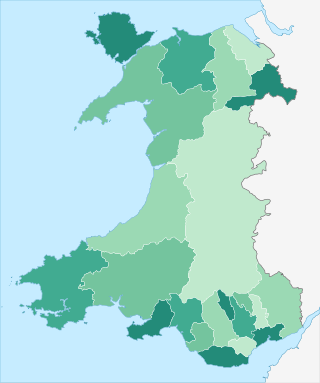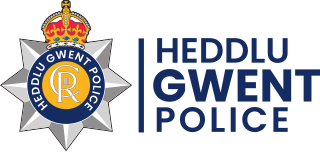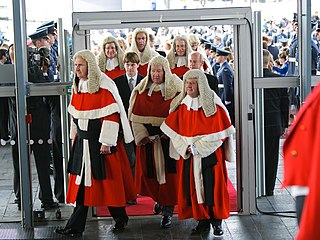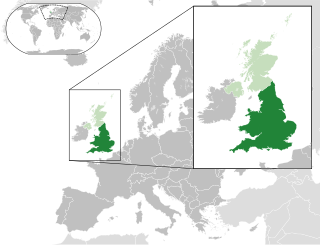Related Research Articles

Welsh is a Celtic language of the Brittonic subgroup that is native to the Welsh people. Welsh is spoken natively in Wales, by some in England, and in Y Wladfa. Historically, it has also been known in English as "British", "Cambrian", "Cambric" and "Cymric".

Wales is a country that is part of the United Kingdom. It is bordered by England to the east, the Irish Sea to the north and west, the Celtic Sea to the south west and the Bristol Channel to the south. It had a population in 2021 of 3,107,500 and has a total area of 20,779 km2 (8,023 sq mi). Wales has over 1,680 miles (2,700 km) of coastline and is largely mountainous with its higher peaks in the north and central areas, including Snowdon, its highest summit. The country lies within the north temperate zone and has a changeable, maritime climate. The capital and largest city is Cardiff.

Since 1 April 1996, Wales has been divided into 22 single-tier principal areas, styled as counties or county boroughs for local government purposes. The elected councils of these areas are responsible for the provision of all local government services, including education, social work, environmental protection, and most highways. Below these there are also elected community councils to which responsibility for specific aspects of the application of local policy may be devolved. The last set of local elections in Wales took place in 2022, with the next due to take place in 2027.

Swansea University is a public research university located in Swansea, Wales, United Kingdom. It was chartered as University College of Swansea in 1920, as the fourth college of the University of Wales. In 1996, it changed its name to the University of Wales Swansea following structural changes within the University of Wales. The title of Swansea University was formally adopted on 1 September 2007 when the University of Wales became a non-membership confederal institution and the former members became universities in their own right.

The Welsh Government is the devolved government of Wales. The government consists of ministers and deputy ministers, and also of a counsel general. Ministers only attend the Cabinet Meetings of the Welsh Government. It is led by the first minister, usually the leader of the largest party in the Senedd, who selects ministers and deputy ministers with the approval of the Senedd. The government is responsible for tabling policy in devolved areas for consideration by the Senedd and implementing policy that has been approved by it.

Ebbw Vale is a town at the head of the valley formed by the Ebbw Fawr tributary of the Ebbw River in Wales. It is the largest town and the administrative centre of Blaenau Gwent county borough. The Ebbw Vale and Brynmawr conurbation has a population of roughly 33,000. It has direct access to the dualled A465 Heads of the Valleys trunk road and borders the Brecon Beacons National Park.
Interpreting is a translational activity in which one produces a first and final target-language output on the basis of a one-time exposure to an expression in a source language.
The Association of Welsh Translators and Interpreters, which brands itself with its Welsh name Cymdeithas Cyfieithwyr Cymru, is a professional body representing English/Welsh translators and interpreters in Wales. The association has some 340 members, most of whom are translators; less than a quarter are interpreters. The Association of Welsh Translators and Interpreters is a member of the International Federation of Translators (FIT).
The Institute of Translation & Interpreting (ITI) is a professional association representing translators, interpreters and language services businesses in the United Kingdom. ITI is affiliated with the International Federation of Translators (FIT).

South Wales Police is one of the four territorial police forces in Wales. It is headquartered in Bridgend.

Gwent Police is a territorial police force in Wales, responsible for policing the local authority areas of Blaenau Gwent, Caerphilly, Monmouthshire, Newport and Torfaen.

Welsh law is an autonomous part of the English law system composed of legislation made by the Senedd. Wales is part of the legal jurisdiction of England and Wales, one of the three legal jurisdictions of the United Kingdom. However, due to devolution, the law in Wales is increasingly distinct from the law in England, since the Senedd, the devolved parliament of Wales, can legislate on non-reserved matters.

South Wales Fire and Rescue Service is the fire and rescue service covering the ten Welsh principal areas of Blaenau Gwent, Bridgend, Caerphilly, Cardiff, Merthyr Tydfil, Monmouthshire, Newport, Rhondda Cynon Taf, Torfaen and Vale of Glamorgan.

Thomas Alun Rhys Davies is a Welsh Labour and Co-operative party politician serving as the Member of the Senedd (MS) for Blaenau Gwent since 2011, and formerly Mid and West Wales from 2007 to 2011. He has served in several Welsh government offices, including Cabinet Secretary for Local Government and Public Services, Minister for Lifelong Learning and Welsh Language, and Minister for Natural Resources and Food.
Telephone interpreting connects human interpreters via telephone to individuals who wish to speak to each other but do not share a common language. The telephone interpreter converts the spoken language from one language to another, enabling listeners and speakers to understand each other. Interpretation over the telephone most often takes place in consecutive mode, which means that the interpreter waits until the speaker finishes an utterance before rendering the interpretation into the other language. As the use of the telephonic modality is increasing it is allowing users to access an interpreter immediately, regardless of time and location.

His Majesty's Courts and Tribunals Service (HMCTS) is an executive agency of the Ministry of Justice. It was created on 1 April 2011 by the merger of Her Majesty's Courts Service and the Tribunals Service.
Public service interpreting in the UK is used by police, courts, immigration services, solicitors, local government, health providers and every other part of the public services that has a language need.

Gwlad is a centre-right Welsh nationalist and pro-independence political party. Its current leader is Gwyn Wigley Evans.

Welsh devolution is the transfer of legislative power for self-governance to Wales by the Government of the United Kingdom.
References
- ↑ "2017.01.26 PI4J email to Warwickshire and West Mercia Police re outsourcing of Language Services". Society of Official Metropolitan Interpreters UK Ltd (SOMI). Retrieved 19 June 2017.
- ↑ "WITS Interpreters - look at the MoJ proposals". ProZ. Retrieved 19 June 2017.
- ↑ "WITS - Wales' leading interpretation and translation service". WITS. Archived from the original on 11 October 2016. Retrieved 19 June 2017.
- ↑ "Wales Launches Interpreting and Translation Service". Translatum. Retrieved 19 June 2017.
- ↑ Mirela Watson. "The changing landscape of Public Service Interpreting in the UK: A survey of the Profession". Academia.edu. Retrieved 19 June 2017.
- ↑ "About WITS". WITS - Wales' leading interpretation and translation service. Archived from the original on 21 October 2016. Retrieved 19 June 2017.
- ↑ "Minister launches Wales Interpretation and Translation Service". WiredGov. Retrieved 19 June 2017.
- ↑ "WITS (Wales Interpretation and Translation Service): Transfer of hosting responsibilities from Gwent Police to City of Cardiff Council". cardiff.gov.uk. Retrieved 19 June 2017.